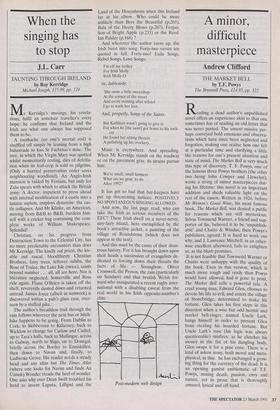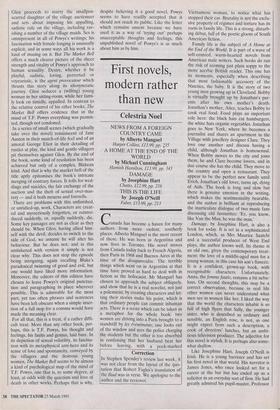A minor, difficult masterpiece
Andrew Clifford
THE MARKET BELL by T.F. Powys
The bynmill Press, £14.95, pp. 322 Reading a dead author's unpublished novel offers an experience akin to that one sometimes has of reading an old letter that was never posted. The unsent missive per- haps conveyed bold emotions and observa- tions which have since been neglected and forgotten, making one realise how one felt at a particular time and clarifying a little the reasons for one's present situation and state of mind. The Market Bell is very much this type of discovery. T. F. Powys, one of the famous three Powys brothers (the other two being John Cowper and Llewelyn), wrote a string of minor masterpieces dur- ing his lifetime: this novel is an important addition and sheds valuable light on the rest of the canon. Written in 1924, before Mr Weston 'c Good Wine, his most famous book, The Market Bell, was denied a public for reasons which are still mysterious. Sylvia Townsend Warner, a friend and sup- porter of his, believed it to be `unpublish- able' and Chatto & Windus, then Powys's publishers, agreed. It is hard to work out why, and J. Lawrence Mitchell, in an other- wise excellent afterword, fails to enlighten us, as the blurb promises.
It is not feasible that Townsend Warner or Chatto were unhappy with the quality of the book. Even in this version, which is much more rough and ready than Powys would have allowed, had it gone to print, The Market Bell tells a powerful tale. A cruel young man, Edward Glen, chooses to devote his life to evil, and enters the village of Stonebridge, determined to make his fortune. Glen takes his first steps- in this direction when a wise but odd hermit and market bell-ringer, named Uncle Lark, hangs himself in order to prevent Glen from stealing his hoarded fortune. But Uncle Lark's ruse (his logic was always questionable) misfires: as he clutches his money in the fist of his dangling body, Glen swaps it for a pine cone. There is a kind of askew irony, both moral and meta- physical, in this: he has exchanged a grow- ing thing for the currency of the dead. It is an opening gambit emblematic of T.F. Powys, mixing death, passion, envy and nature, yet in prose that is thoroughly amused, lyrical and off-hand. Glen proceeds to marry the smallpox- scarred daughter of the village auctioneer and sets about imposing his appalling, sadistic rule on the village, including rav- ishing a number of the village maids. Sex is omnipresent in all of Powys's writings; his fascination with female longing is unusually explicit, and in some ways all his work is a kind of musing on it. But The Market Bell offers a much clearer picture of the sheer strength and vitality of Powys's approach to human sexuality. Desire, whether it be playful, sadistic, loving, perverted or voyeuristic, is the agent provocateur which thrusts this story along its idiosyncratic journey. Glen seduces a (willing) young woman in her sitting-room, while her fami- ly look on timidly, appalled. In contrast to the relative control of his other books, The Market Bell offers evidence that in the mind of T.F. Powys everything was permit- ted, though not condoned.
In a series of small scenes (which gradually take over the novel) reminiscent of Jane Austen in their snatch-of-life feel and of an amoral George Eliot in their detailing of rustics at play, the kind and gentle villagers pit themselves against Glen. By the end of the book, some kind of resolution has been achieved but only of a complex, Blakean kind. And that is why the market bell of the title aptly epitomises the book's intricate merging of contrary forces. It tolls for wed- dings and suicides, the fair exchange of the auction and the theft of sexual over-mas- tery — and it both mourns and foretells. There are problems with this unfinished, or untidied-up, work. Characters are creat- ed and mysteriously forgotten, or reintro- duced suddenly, or, equally suddenly, die. Some key passages are not as clear as they should be. When Glen, having allied him- self with the devil, decides to switch to the side of God, we assume he will alter his behaviour. But he does not; and in this untinkered with version it simply is not clear why. This does not stop the episode being intriguing, again recalling Blake's paradoxical twinning of good and evil, but one would have liked more information. Moreover, the editors of this edition have chosen to leave Powys's original punctua- tion and paragraphing in place wherever possible. This is admirable for the most part, yet too often phrases and sentences have been left obscure when a simple inser- tion of a full stop for a comma would have made the meaning clear.
For all that, this is a treat, if a rather diffi- cult treat. More than any other book, per- haps, this is T.F. Powys, his thought and feelings, his faults and genius, laid bare. In its depiction of sexual volatility, its fascina- tion with its metaphysical anti-hero and its sense of love and spontaneity, conveyed by the villagers and the desirous young women, The Market Bell seems to be almost a kind of psychological map of the mind of T.F. Powys, one that is, to some degree, at least, at odds with the quietism and love of death in other works. Perhaps that is why,
despite believing it a good novel, Powys seems to have readily accepted that it should not reach its public. Like the letter which remains unsent because we have used it as a way of 'trying out' perhaps unacceptable thoughts and feelings, this unpublished novel of Powys's is as much about him as by him.



























































 Previous page
Previous page